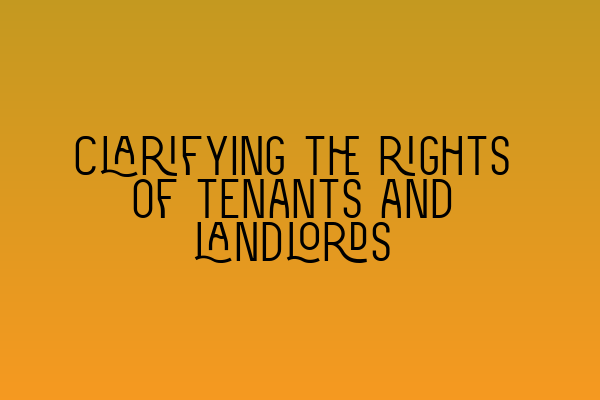Clarifying the Rights of Tenants and Landlords
In recent years, there has been a significant increase in the number of individuals entering into tenancy agreements, whether as tenants or landlords. With this increase, there has also been a rise in the need for a better understanding of the rights and responsibilities of both parties involved. As a solicitor at SQE Property Law & Land Law, I strive to clarify these rights and shed light on the key aspects that tenants and landlords should be aware of. In this blog post, we will discuss the rights of tenants and landlords, including their legal obligations, and provide guidance on how to navigate common issues that may arise during a tenancy.
Understanding the Rights of Tenants
Tenants have several fundamental rights that are protected by law. These rights ensure fair treatment and security throughout their tenancy period. Let’s delve into some of the key rights of tenants:
1. Right to a Written Tenancy Agreement
All tenants are entitled to a written tenancy agreement that sets out the terms and conditions of the tenancy. This agreement should clearly outline the rent amount, agreed-upon dates, and any special conditions or obligations.
2. Right to Live in a Safe and Habitable Property
Landlords have a legal obligation to provide tenants with a safe and habitable property. This means ensuring that the property meets health and safety standards, including proper maintenance, functioning heating and plumbing systems, and protection from hazards.
3. Right to Privacy
Tenants have the right to privacy and peaceful enjoyment of their rental property. Landlords should not enter the property without providing proper notice, except in emergency situations. Tenants should also be aware of their responsibilities to maintain the property’s cleanliness and operability.
4. Protection Against Unfair Eviction
Tenants have protection against unfair eviction. Landlords must follow proper legal procedures and obtain a court order before evicting a tenant. It is essential for tenants to understand their rights and seek legal advice if they believe they are being unfairly evicted.
Understanding the Rights of Landlords
While tenants have certain rights, it is also crucial to understand the rights of landlords. Balancing the rights and responsibilities of both parties is key to maintaining a healthy landlord-tenant relationship. Let’s explore some of the rights of landlords:
1. Right to Receive Rent Payments
Landlords have the right to receive timely rental payments as agreed upon in the tenancy agreement. It is crucial for tenants to fulfill this obligation and pay their rent on time. Failure to do so may result in legal consequences, such as eviction.
2. Right to Proper Use and Care of the Property
Landlords have the right to expect tenants to properly use and care for the rental property. This includes keeping the property clean, reporting any necessary repairs promptly, and not causing damage beyond normal wear and tear.
3. Right to Financial Compensation for Damages
If tenants cause damage to the rental property beyond reasonable wear and tear, landlords may have the right to seek financial compensation. This compensation can be deducted from the tenant’s security deposit or pursued through legal means.
4. Right to Access the Property
Landlords have the right to access the property for specific reasons, such as repairs or inspections. However, they must provide proper notice to the tenant and respect the tenant’s right to privacy. It is essential for landlords to adhere to the legal requirements to avoid potential disputes.
Navigating Common Issues
While understanding the rights and responsibilities of tenants and landlords is essential, it’s equally crucial to navigate common issues that may arise during a tenancy. Here are a few common issues and some guidance on how to handle them:
1. Rent Arrears
If a tenant falls behind on rent payments, landlords should try to resolve the issue amicably. Communication is key, and landlords should discuss the situation with the tenant to understand the reason for the delay. If necessary, legal advice should be sought to ensure appropriate action is taken.
2. Repairs and Maintenance
Both tenants and landlords have responsibilities when it comes to repairs and maintenance. Tenants should report any necessary repairs promptly, while landlords should address these issues in a timely manner. In case of disputes, seeking legal advice can help ensure a fair resolution.
3. Dispute Resolution
If conflicts arise between tenants and landlords that cannot be resolved through communication, it may be necessary to pursue formal dispute resolution methods. This can include mediation, negotiation, or in some cases, legal action. Seeking legal advice is crucial for tenants and landlords to understand their options and rights in these situations.
Conclusion
Understanding the rights and responsibilities of both tenants and landlords is crucial for maintaining a harmonious landlord-tenant relationship. By familiarizing themselves with these rights, individuals can navigate common issues and ensure a fair and mutually beneficial tenancy experience. Seeking legal advice from professionals, such as SQE Property Law & Land Law, can provide further guidance and support throughout the process.
For further reading and preparation for legal exams, please check out our related articles:
– SQE 1 Practice Exam Questions.
– SQE 1 Practice Mocks FLK1 FLK2.
– SQE 2 Preparation Courses.
– SQE 1 Preparation Courses.
– SRA SQE Exam Dates.
At SQE Property Law & Land Law, we are dedicated to providing comprehensive legal services to assist clients in understanding and protecting their rights as tenants or landlords. Contact us today for professional legal advice and support.
